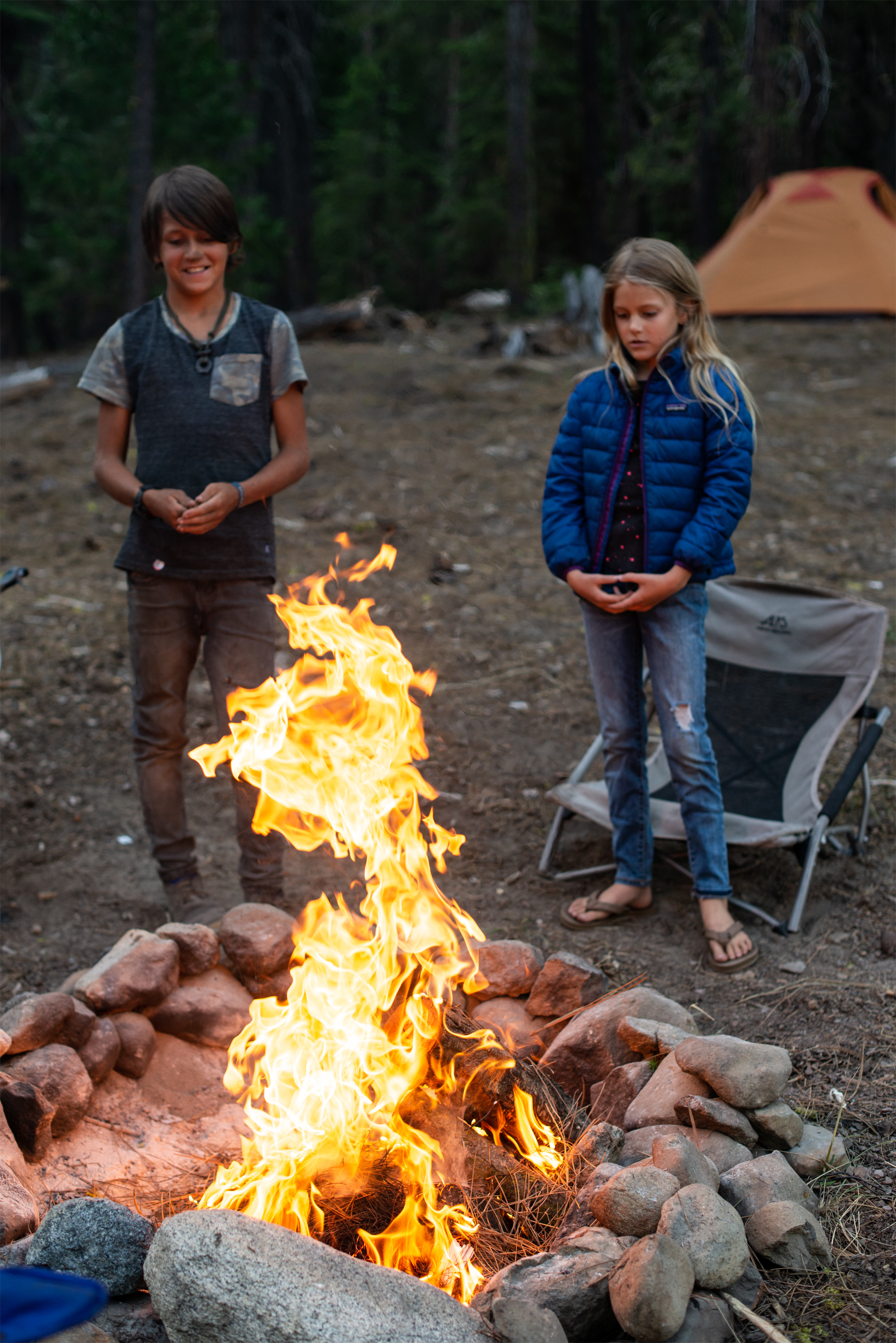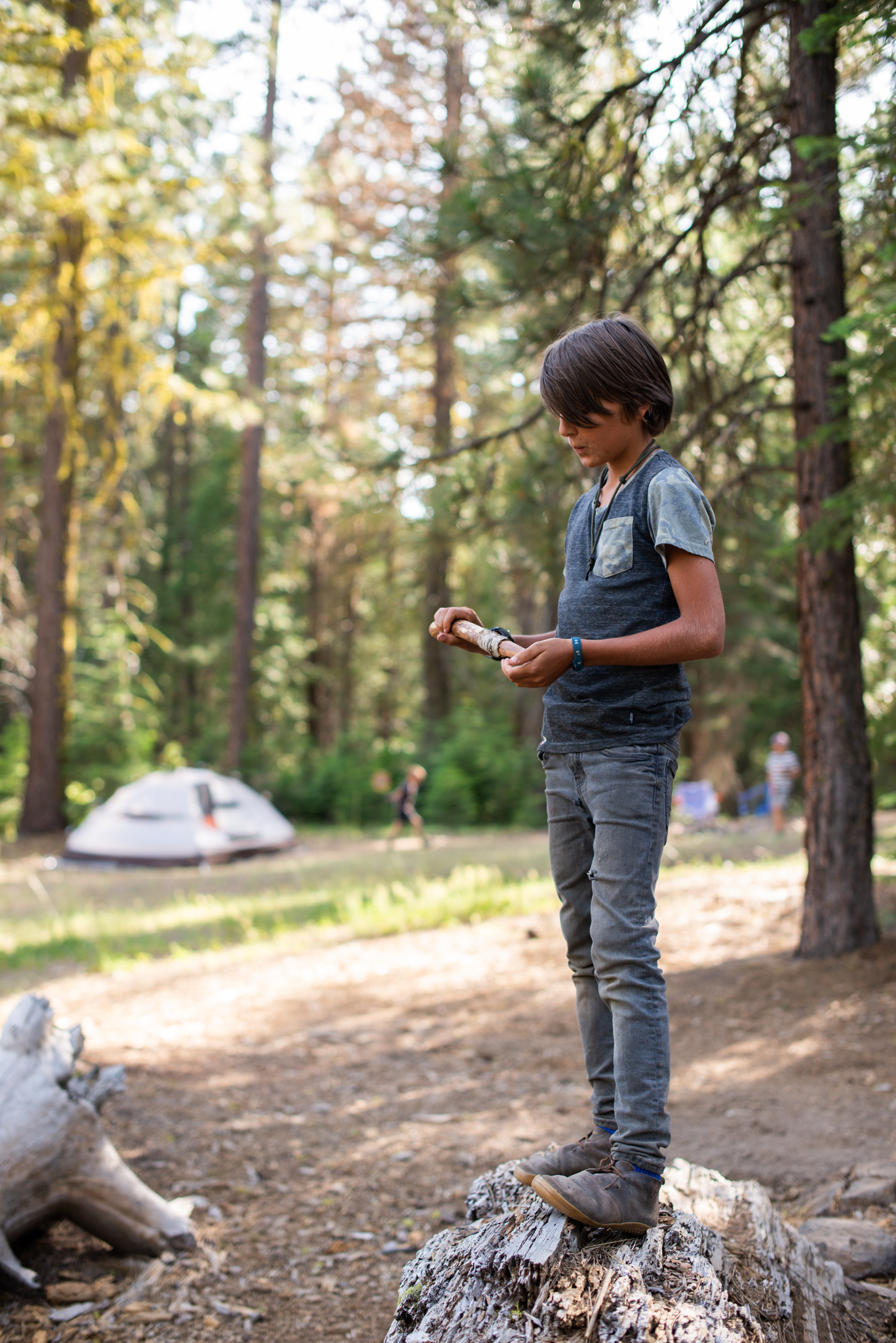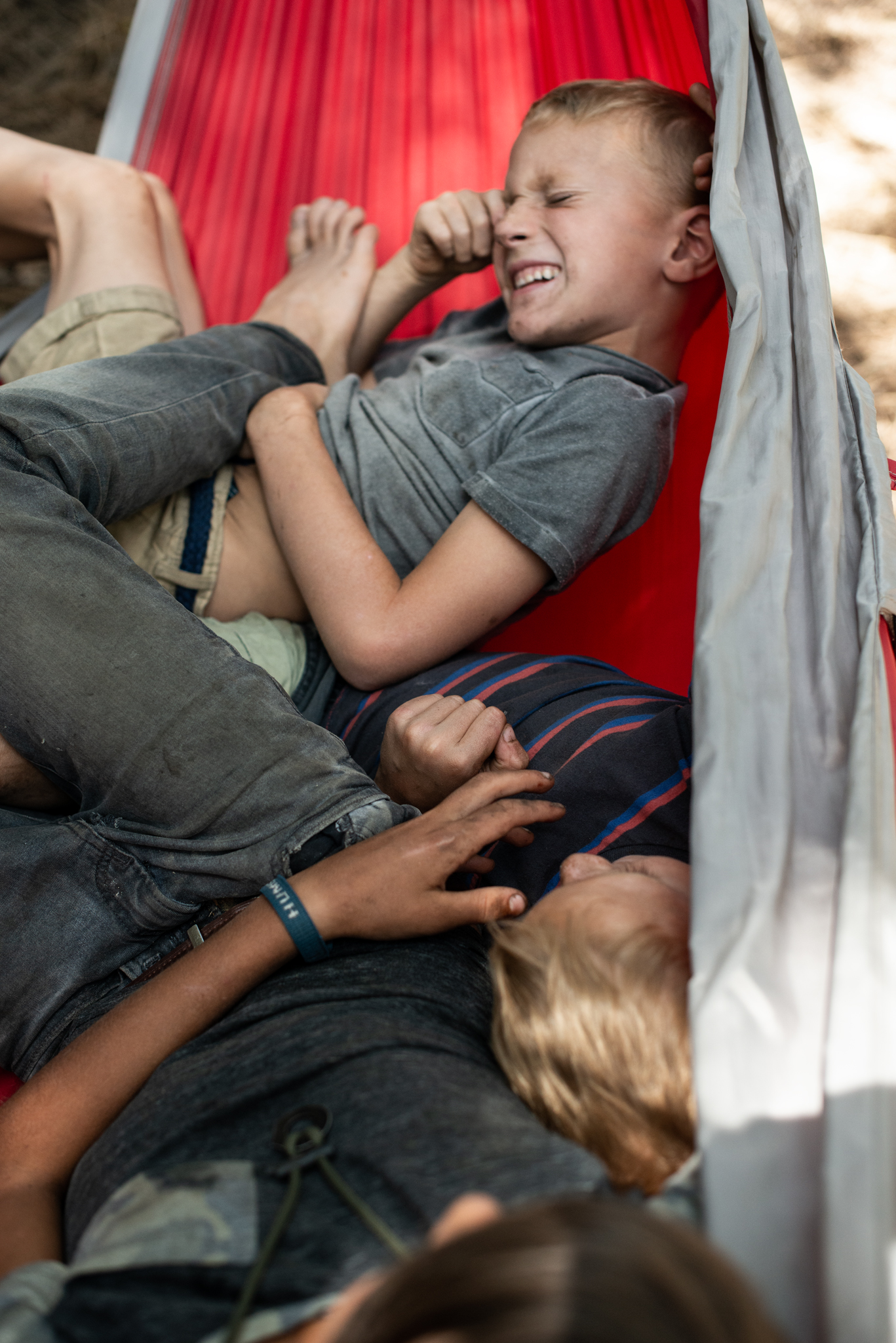These pictures are entirely irrelevant to the post, but I have been trying to pull out my DSLR camera more often, so these are from a camping trip the kids and I went on a few days ago. It was the sweetest time and I find that the more we do these things, the more dialed in we get, which makes everything so much easier. The boys set up the entire camp while Lu and I set up the kitchen area and it made me so grateful to be in this stage where they are so capable! Every new stage has greater benefits!!
Regarding last year… it was very challenging. I am hoping that this will be one of those school years that I can share about with other moms in the future when they are encountering difficult times—you know, to tell them it’s temporary?! We started our year pretty depleted from house renovations and then there are some very trying ongoing situations that we have had to work through outside of our home, which have all affected the heart of our schooling (mostly because I’m distracted). We also had lost most of our smaller homeschooling community to a private school, so we had to navigate our way through figuring out a new rhythm with different friends. That part ended up being bittersweet, because as I grieved the loss of our old community (even though we are all still great friends), it was sweet to spend time with families that we hadn’t ordinarily done life with. I am looking forward to doing more of that this upcoming year as well! All I can think about this last year is that it was a trying season, but that doesn’t mean that there wasn’t beauty in it. Our word for last year was “GROWTH” and I couldn’t think of a better word for it. Unless it was something like “HANDLED” or “BROKE.” But that’s not very positive!!
Now that I got some of the emotional stuff out the way, let’s recap some of our academics. If it helps at all, the finished years of the children are as follows:
Carter—7th, Everett—5th, Scarlett—3rd, August & Elias—1st.
Grammar & Spelling:
I had mentioned that Carter was going to take “Foundations of Writing” through HSLDA. This class was a high school class and was divided between grammar and writing. It was an experiment for me because, if you’ve read my Getting Started Manual, you would know that I don’t believe in formal grammar until at least junior high, maybe even high school! I just don’t think that a subject should have that much repetition. If it requires years and years of the same practices, obviously our children are not cognitively capable of understanding. It should take one time. Anyway, that’s my philosophy, and I was curious to see if formal grammar lessons, let alone at a high school level, would be too much for Carter. He loved it and was just fine. As per my assumption, they reviewed all of the parts of speech and basic mechanics within the first few weeks. Because he was cognitively ready, he was able to understand and apply those mechanics immediately. They worked through “Analytical Grammar,” for those who are interested in the curriculum he used. For the writing portion of his class, he spent a lot of time online writing and conversing with his fellow classmates. I did not like this portion of the class. Since we try to keep technology low in our household, it was hard for me to see him on the computer so much. Also, the subjects of some of his essays were frustrating for me. He had to write persuasive essays on subjects such as social media, following trends, and other mediocre topics. After having years of beautifully written narrations, this was by far the most challenging part of “letting go.” It didn’t last long. :) I decided that I only get him for two more years before he heads to college (through a dual enrollment program) and I wanted control over the content that he was writing about. Therefore, we dropped out of the writing portion and he was able to join us again in our notebooking.
The younger four were combined in an introductory grammar lesson, via the curriculum “Daily Grams.” This was another experiment as I have not done any curriculum in the past few years aside from math. Each twin had a workbook while I dictated the sentences to Scarlett and Everett. Daily Grams covered very basic grammatical principles, includings some parts of speech, capitalization, and formatting (such as letters and addressing envelopes). While it’s not my favorite subject, I enjoyed having them all at the table together and also appreciated some of the simple concepts that they learned. We did this lesson four days a week and it took about 10 minutes.
After completing Daily Grams, we would move onto spelling. I pulled Spalding lists from the internet for first grade, and would dictate a weekly list. If the older two were able to finish the list without any errors, they would not have to go on with that list for the week. After dictating the list each day (there were typically 30 words), I would then dictate five sentences that used most of the spelling words. I would not repeat the sentences to the older two, and they had to use cursive, but the younger two had less limitations, because the sentences were often too rigorous for them to remember. Many times I would add some grammatical elements to help apply some of the material we learned in Daily Grams (ie: possession, commas, capitalizing proper nouns, etc.). Here are some examples of sentences I would dictate: “He’s sorry he broke the young woman’s sugar press.” or “Who among you thought we should swim in January?” I have been asked a lot about our spelling approach on Instagram and I am considering writing a spelling list/ sentence dictation block. If you’re interested in this, let me know and that might motivate me to do it. :) Our spelling lessons were typically 15 minutes a day, for four days. I started giving spelling tests on Fridays because the twins requested them. If either or both of the older two hadn’t yet passed, they would also take the test on Friday.
Upon finishing our Spalding lists, we would then move onto Sequential Spelling for the older two. I personally enjoy the fact that it includes prefix, suffix work and allows the children to figure out spelling patterns based off of adding or taking away from the root word (without having to have a separate lesson). They do this list in cursive as well.
Bible, Memory Work, History, Nature Study, Science, and Literature
We cover Bible, prayer, stories of martyrdom, memory work (Bible verses, poetry & hymns), history, nature study, science, and fictional literature through our Morning Collective time. I allocate certain days to certain subjects, but Bible, prayer, stories of martyrdom and memory work are our daily practices, as well as the current fictional piece to finish it off. We narrate usually after each read, but our narrations depend on our time frame (you can read about this whole process in my Getting Started Manual).
We did two blocks in the year, the Art Study and the Wildcraft Study. They were awesome! Our block work is done after our daily practices and replaces history, nature study, and science, although usually those subjects are naturally woven throughout the studies. The blocks allow us to get a little more hands-on and subject-specified, which is a nice break from all the short readings that we do throughout the year.
Writing:
We continued our informal writing lessons through Notebooking. I mentioned two different new techniques for our writing and Notebooking in a recent Wild + Free conference and I’ll include them in here for you as well. In my Notebooking Manual, I mention that we notebook up to four times a week. Since we have added grammar and spelling lessons in, we now only notebook 3x/ week. On Mondays, it’s our copywork for whatever verse/ poem/ hymn we are memorizing. Tuesdays and Thursdays are written and illustrated narrations. If you would like more information on how we notebook and how they organically learn to spell/ write, you can find that all in the Notebooking Manual. :)
Here are the two types of narration that I referred to at the conference as “Burnout Narration:
Classroom Narration
We gather together in front of the chalkboard and I have them take turns narrating in sequential order. If someone has a helpful date or fact, or any information to add, they raise their hand and respectfully interject after the individual child’s narration.
I write down key points from their narration on the board.
The oldest child writes three 5-sentence paragraphs, the middle two write 2 5-sentence paragraphs, and the twins write one 5 sentence paragraph.
They take the sequential facts, make complete sentences out of them, and fill them with beautiful language to create a written narration.
Then they illustrate.
Quick Write Narration
After completion of Morning Collective, the children either narrate from their choice of readings or I assign a narration. They get the same assignment as before (paragraph-wise). Their sentences have to be complete and legible and they write them in their “free write” composition books. I go through each one, correct spelling and grammar, discuss with them their mistakes, and then they make the corrections.
On another day, if I don’t have the time or energy for the entire process of notebooking, I will have them select one of their narrations from their free write book and they will illustrate and copy them using our notebooking technique. This way we have a beautiful record of their narration, but it is broken down in steps and I am barely involved. :) I look at it as mediocre notebooking, haha!
Math:
If you have come to “know” me, then you understand that I am a big fan of change, however, I am so surprised to see that we have stuck with the same math curriculum all of these years! The youngest four continued to work through Math Mammoth. We don’t have specific time frames for them to complete a year because they do math year-long. Currently the twins are in 3rd grade math and Scarlett is in 4th grade.
Everett wakes up at 5:30am to go to work at the llama farm and likes to get his math done before he leaves. We were struggling with some accountability there, so I had to move him to an online program that will check his work for him and that I can monitor without his math papers becoming fire starters. ;) My friend, Rachel Kovac, mentioned that her son uses the online program “Thinkwell.” I checked it out and appreciated its method, so I signed him up for the 6th grade math course at the end of the school year. It has been the perfect balance for us and provides the right amount of accountability that I was struggling to keep.
Carter took a year of Algebra 2 through HSLDA. He liked it, but his teacher wasn’t his favorite (which was nice, because I want him to experience sticking through a course even though not all teachers are a great fit). He also joined Thinkwell when the school year ended and has been working through their PreCalculus class. I am not sure what we are going to do for him next year.
As for next year, I am not sure of our plan. Using our approach doesn’t require much planning, glory! However, I would like to take some time to pray and figure out what direction we will head in. I will try to come back here and share any new resources should we choose to use any. I can’t believe we are going into our sixth year. It seems like just yesterday when we started so young and so fresh!
Also, I will try and come up with a book list of some of our favorites from last year. I am SO bad at documenting our finished materials, but I will sit with the kids and find out their favorites. I’ll save that for the post to come. :)
I hope you’re enjoying your summer! xo














